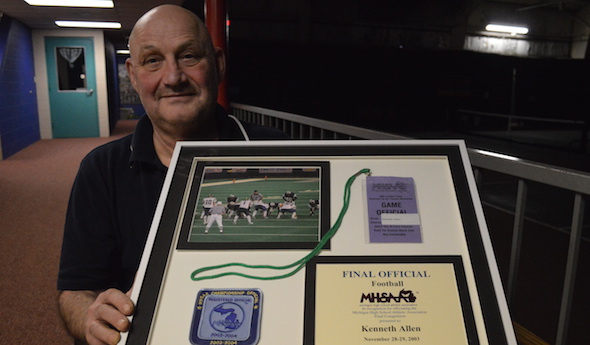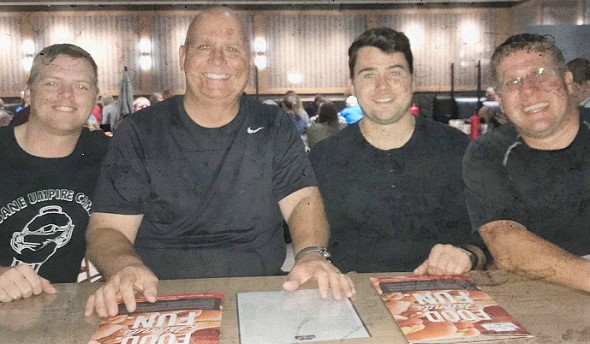
Umpire's Heart Healed, Back in the Game
April 4, 2017
By Mike Spencer
Special for Second Half
Ken Allen can’t wait to say the words “Play Ball!’ today.
Weather permitting, the Traverse City softball umpire is expected to be behind the plate at Kingsley this afternoon after missing all of the spring season last year due to a heart double by-pass surgery.
“I’m sure It’s going to be exciting,” said Allen, a 32-year MHSAA umpire, basketball and football referee. “Especially after taking a year off from softball.
“But once the game gets started and you make that first call, it’s going to be right back to the old business.”
Allen, who has hardly missed a game since Dick Simon recruited him to officiate in 1985, was glad he went to his primary care physician after he noticed he was slowing down at the end of the 2015-16 boys and girls basketball season.
Allen’s doctor did an EKG and referred him to a heart surgeon, where he underwent a cardiac catheterization. Before the visit with the heart specialist was over, Allen was wheeled up to the second floor for heart surgery.
“It changed things, but I keep telling everybody that the man above gave me a second chance and I’m going to take full advantage of it,” said Allen, who was told he’d need at least three months to recuperate. “It was hard to be idle.”
“Ken is an ‘old school’ die hard,” said Barb Beckett, a charter member of the Northern Sports Officials Association, former officiating partner and assignor. “He is an assignor’s dream because he will go anywhere, work any level, and anytime.
“It was tough on him missing the last part of the basketball season and entire softball season. He makes a difference every time he steps on the court or the field."
Allen, who has officiated two MHSAA Finals in softball and another in football, never thought about retiring after his double by-pass on March 3, 2016.
“I never had a thought about quitting, and I don’t have a plan to retire,” Allen said. “I’m going to go as long as I can.
 “When I can’t give the kids a full 100 percent, it’ll be time to get out.”
“When I can’t give the kids a full 100 percent, it’ll be time to get out.”
Allen had a clean bill of health to officiate football last fall, but he missed two weeks of the season after having his gall bladder removed. He then went on to work the entire boys and girls basketball season, which ended last month.
“Ken has always been a very hard-working official, and it’s no surprise to anyone that he has worked so hard to get back on the field and court,” said MHSAA assistant director Mark Uyl, the association’s coordinator of officiating. “Ken always had a true passion for officiating, and this passion has helped him recover and has been a source of motivation to get healthy and rehab so he can return to the competitive arena.”
Uyl said life-threatening illnesses and injuries often send veteran officials into early retirement.
“For many other officials, what Ken endured would have meant retirement or the end of their career, certainly in a sport like basketball,” Uyl said. “It shows how important working with the kids and schools is to Ken that he’s persevered so hard to get back.”
Allen also officiated baseball until the day he lost a coin flip and had to leave his softball game because no one showed up at the baseball field. His softball partner Tom Post tooted his horn departing after two quick softball games and Allen was still in the bottom half of his opener.
Although Allen has officiated two MHSAA softball championship games, football is his No. 1 sport. He worked a 2003 MHSAA Final as the umpire.
“When I first started out, I was on the chains,” said Allen, who played freshman football at Clio High and ran track and cross country. “Then I decided that I wanted to get in the middle where the action is. I really love it.”
Allen’s taken a few knocks in the middle of the football field, even suffered a couple of concussions. But until the heart double by-pass, he was always able to get back up on his feet without hardly missing a down.
“Ken is a great official because he’s got such good people skills,” Uyl said. “The officiating business is a ‘people business’ first and foremost, and this is why this has been such a great fit for Ken for the past 30-plus years. The MHSAA and all member schools are thrilled to have Ken back!”
Author Mike Spencer is a MHSAA registered official in boys and girls basketball and soccer. He spent more than three decades as a newspaperman before becoming a marketing communications specialist two years ago.
PHOTOS: (Top) Ken Allen, a 32-year veteran official from Traverse City, shows off his most memorable moment in high school officiating with photos and items he received after doing a 2003 MHSAA Finals assignment. (Middle) Allen kneels behind the plate; today he’ll return to action for the first time after heart surgery.

The Official View: Night with the Crew
By
Brent Rice
MHSAA Assistant Director
October 1, 2018
By Brent Rice
MHSAA Assistant Director
In this week’s edition we discuss the power of our words and delivering them proactively, examine a football rule regarding rushing the punter and take a look at an “It’s Your Call” at the volleyball net.
It’s Official!
The Words We Use: Officials face criticisms regularly for their rule enforcement, judgment decisions and even positioning. As we know, these criticisms will be tossed about whether you get plays and rulings correct or not, so there is very little we can control in this area. One area we can control the criticisms we receive is the way we speak to others.
I’ve heard people say, “I’ll give them respect when they earn it.” If that’s your line of thinking, maybe you should consider giving respect simply because it’s the right thing to do. The way you communicate as an official to coaches, players and administrators reflects on you professionally, and often is a determining factor on how these parties view you in carrying out the rest of your responsibilities. If they think you’re a bad person, they often don’t give you the benefit of the doubt in close-call situations.
There are a number of books written on the art of diffusing situations through the words you use. One that immediately comes to mind is “Verbal Judo” by George Thompson. It is rather succinct and definitely worth the read. It provides much more detail on the philosophy of word usage, but let me provide you with a couple of seemingly innocuous phrases that can draw the ire of a coach and should be avoided:
“Well, that’s the rule” – Rules citation is very important when providing explanations, but simply stating that the rule says so sounds flippant and is looked at as a cop-out. Instead, start with “By rule,” then use rulebook terminology to describe the situation and ruling.
“Calm down” – While this is much better than the cringe worthy “Shut up” or “Hush” we hear being used from time to time, it still can provoke a primal urge to respond and can actually have the opposite effect of what is intended. Instead, try getting the results you desire by having them talk it through. Try statements like “All right, I’m listening to you,” or “Okay, explain to me what you’re asking.” And when using a phrase like “calm down,” trying adding an “if” statement along with it. For instance, “I’ll explain to you what I have if you calm down.”
Rule of the Week
FOOTBALL Team R loads up the box with rushers to put pressure on K’s punt deep in its own zone. As K1 punts, R1, coming from the center of the line, just gets fingers on the ball and partially blocks it. R2, from the edge, then firmly contacts the kicker’s plant leg and sends him to the ground.
Ruling: This is not a foul (in itself). The rulebook does not provide that only the player who touches the kick is excused from contacting the kicker. This exception to the rule refers only to when “the defense touches the kick.” (9-4-5-b) Of course, this does not give carte blanche to defensive players to go out of their way to unnecessarily rough the kicker just because the ball is touched.
It’s Your Call
VOLLEYBALL The clip from this week picks up after an extended volley. As Team S plays the ball over the net for its third hit, a front row member of Team R makes a play on the ball. The questions is, are the two contacts by the front row R player legal? Why or why not?
Last Week’s IYC Ruling: The basic spot on the play is the end of the run. Using the all-but-one principle, this foul would be penalized from the spot of the foul (A’s 35). If the defense accepts the penalty, it would be A’s ball, 3rd-and-27 on A’s 20. If the defense declines, it would be 4th-and-8 on A’s 39. This is definitely an instance that you want to run the options by B’s coach before enforcing the penalty. (Click to see the video from last week.)
Official View
After a long, hard-fought Friday night contest between Rockford and Greenville, crew members (left to right) Dale Feutz, Brian Donovan, Sam Boland, and Luke Griemsman stop in at a local Rockford eatery to discuss the night’s game over a meal.

